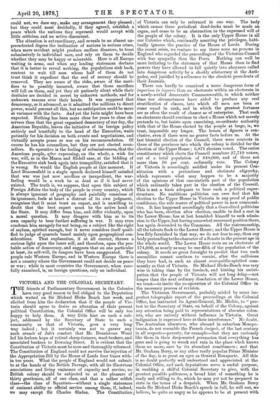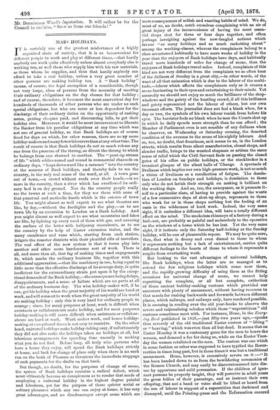VICTORIA AND THE COLONIAL SECRETARY.
THE friends of Parliamentary Government in the Colonies have very good reason to feel obliged to the Deputation which waited on Sir Michael Hicks Beach last week, and elicited from him the declaration that if the people of Vic- toria should agree to desire an alteration of their present political Constitution, the Colonial Office will be only too happy to help them. A very little hint on such a sub- ject, addressed by the Secretary of State to such a community as that of Victoria, goes a very long way indeed ; but it certainly was not to garner any such crumb of Job's comfort that Mr. Dennistoun Wood led his forlorn hope of retired sheep-farmers, wool-brokers, and associated bankers to Downing Street. It is evident that the Constitution of Victoria must be soon and thoroughly reformed. The Constitution of England could not survive the rejection of the Appropriation Bill by the House of Lords four times with- in ten years. What the people of England would not submit to at the hands of the British Peerage, with all its illustrious associations and living eminence of capacity and service, no British colony should be subjected to at the pleasure of thirty gentlemen, all of one class, and that a rather selfish class—the class of Squatters—without a, single statesman of eminent ability or official service among them, if, indeed, we may except Sir Charles Slade% The Constitution
of Victoria can only be reformed in one way. The body which causes these periodical dead-locks must be made an organ, and cease to be an obstruction to the expressed will of the people of the colony. It is the only Upper House in all our Colonies which, continually asserting the privileges, habi- tually ignores the practice of the House of Lords. During the recent crisis, we venture to say there were no persons in England who regarded the proceedings of the Victorian Council
with less sympathy than the Peers. Nothing can well be more irritating to the statesmen of that House than to find powers they have allowed to fall quietly into abeyance called into dangerous activity by a shoddy aristocracy at the Anti- podes, and justified by a reference to the obsolete precedents of their Journals.
There can hardly be conceived a more dangerous form of imperium in imperio than an electorate within an electorate in a newly-settled democratic Commonwealth, in which neither time nor circumstances have aided to produce any real stratification of classes, into which all men are born or come equal in rank, and in which the greatest fortunes are as often the result of chance as of enterprise. That such an electorate should continue to elect a House which not merely pretends to, but insists upon exercising, co-ordinate authority with that of the House elected by the people at large, is, we trust, impossible any longer. The lesson of figures is con- clusive, even if there were no graver facts before us. At the last biennial election of the Council, there were contests in three of the provinces into which the colony is divided for the election of the Upper House ; 6,871 electors voted. The entire constituency which elects the Council numbers 27,719 voters, out of a total population of 840,000, and of these not more than 50 per cent, ordinarily vote. The Colony of Victoria is accordingly saddled under its present Con- stitution with a pretentious and obstinate oligarchy, which represents what may happen to be a majority of the opinions of that one-sixtieth part of the population which ordinarily takes part in the election of the Council. This is not a basis adequate to bear such a political super- structure. No ambitious politician can ever feel that his election to the Upper House in Victoria is any proof of public confidence, the sole source of political power in new communi- ties. It has happened accordingly that a discredited politician who has been, election after election, unable to find a seat in the Lower House, has at last humbled himself to seek admis- sion to the Upper, but having somewhat recovered position there, has again descended to the Commons. All the statesmanship, all the talents flock to the Lower House; and the Upper House is less fitly furnished in that way, we do not fear to say, than any body pretending to the character of a Senate in the present age in the whole world. The Lower House rests on an electorate of 174,000, as nearly as may be one-fifth of the population of the colony. It needs no great foresight to predict that two such assemblies cannot continue to coexist, after the collisions they have had, in such an almost over-public-spirited com- munity as that of Victoria. Sir Michael Hicks-Beach was very wise in taking time by the forelock, and hinting his antici- pation that the people of Victoria will not long delay—not longer than the next ordinary dissolution of the Lower House, we trust—to invite the co-operation of the Colonial Office in the necessary process of revision.
The Victorian Government, probably misled by some im- perfect telegraphic report of the proceedings at the Colonial Office, has instructed its Agent-General, Mr. Michie, to "pro- test to the Secretary of State, on behalf of the Colony, against any attention being paid to representations of absentee colon- ists, who are entirely without influence in Victoria. Great indignation is expressed here at their interference." Nc dcubt. The Australian absentees, who abound in suburban Mesopo- tamia, do not resemble the French e'migre's, of the last century in all respects—poverty, for example—but they are curiously like them in their deep-seated persuasion that everything has gone and is going to wreck and ruin in the place whch knows them no more, save by its abundant remittances ; and that Mr. Graham Berry, or any other really popular Primo Minister of the day, is as great an ogre as General Bonaparte. All this is no doubt perfectly well understood and appreciated at the Colonial Office, and such deputations serve a useful purpose, in enabling a skilful Colonial Secretary to give, with the greatest possible politeness, a broad hint of something he is ready and willing to do, which he may yet not be prepared to state in the terms of a despatch. When Mr. Graham Berry reads Sir Michael Hicks Beach's speech in full, he will not, we believe, be quite so angry as he appears to be at present with
Mr. Dennistoun Wood's deputation. It will rather be for the Council to exc'aim, "Save us from our friends ! "



































 Previous page
Previous page